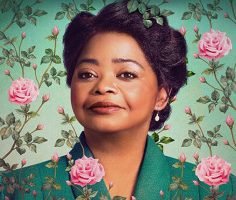Was “Self Made” the story of a black hero or another political agenda?
The intersection of racism, colorism, and feminism

By Source (WP:NFCC#4), Fair use, Link
“Self Made” inaccurately portrays certain black historical figures in a negative light.
April 2, 2020
To me, black history is an endless story of resilience–telling, no matter how far we are set back, we will always find a way to overcome. To the makers of “Self Made,” however, black history is an endless fight among self. Though this may be true to an extent, using the over-sensationalization of the “we are our biggest enemy” narrative to change our positive perception on black historical figures (once again) is a slap in the face to their legacy and black culture in general.
Madam C.J. Walker (Octavia Spencer) invented a line of African American hair products after suffering from a scalp ailment that resulted in her own hair loss. She promoted her products by traveling around the country giving lecture-demonstrations and eventually established Madame C.J. Walker Laboratories to manufacture cosmetics and train sales beauticians. She was one of the first African American female self-made millionaires.
The musical score and cinematography of the mini-series/movie gave the film a modern flair, and I loved that it portrayed Walker in such a positive light for the most part.
Black hair, just like its people, is strong, diverse and resilient. Walker revolutionized the black hair industry with the products that she sold with her story. To her, hair was beauty.
Colorism, Feminism and Racism
As portrayed in the film, racism played a huge role in Walker’s journey, as it did with most other black historical figures. From scenes as simple as the neighborhood gathering and celebrating Jack Johnson beating the Great White Hope to the struggles they went through for Walker’s business to become legit, the film did an amazing job on portraying how a win for one person in the black community was a win for all.
That only applied to black men winning, of course.
Though initially supportive of her endeavors, her husband, C.J. Walker (Blair Underwood), felt emasculated by Walker’s dominant presence and ownership of the business. I personally never sympathized with him because he wanted her to submit to domestic ideals, often attempting to convince her to give up on her dreams. Luckily, Walker never listened.
Black women often have troubles in choosing which is more important: the betterment of the race or the representation of women. Most know that both are equally important, but they are put in situations where they have to choose.
This is evident in “Self Made” when all of the black wives, who were educated and successful, did not feel as if they had a place to talk in the black business convention even though they were the brains of the operations. They chose the betterment of the race over the representation of women.
Being that they figured they would not be taken seriously in formal business settings, they allowed their husbands to oversee all business exchanges and run the companies because that was they only way they felt their businesses would be successful.
Even in the early 1900s when the feminism movement was at its strongest, it mostly included only white women, for black women had to have movements of their own.
Walker was different, however. She didn’t choose the race or the woman; she chose the black woman. Her passion and drive all rooted from her desire to make all black women feel beautiful and confident. She had black women investors and saleswomen. Her business tactics not only changed the game in cosmetology but also in female entrepreneurship.
My biggest problem with the film, however, is how they made colorism a prominent issue and a driving factor for Walker. Colorism was and always has been an issue in the black community. Beauty was measured by Eurocentric standards. Fair-skinned, mulatto women were often held to a higher standard than darker-toned black women.
One of Walker’s goals in the film was to change the idealistic image of a beautiful black woman by showing that black beauty can come in all different forms and skin tones.
I loved the message that the film portrayed through colorism, but I did not like how it went about portraying it.
The film portrayed black female inventor, businesswoman and philanthropist Annie Malone as Addie Monroe– a condescending, white/light-washed, self-hating, bitter business woman. The real Annie Malone wasn’t even light-skinned. She was a dark-skinned, self-taught chemist, yet the film didn’t even show her making any of her products.
It pitted two successful black women against each other by making up this fake colorism narrative when in real life Malone was Walker’s mentor and business partner for a short period of time.
This makes me question the goal of this film: to tell an accurate and truthful story or to cause division. Both women could’ve accurately coexisted in the narrative, and it still would’ve had texture. Both faced sexism, racism and colorism, and both overcame all of it.
I am honestly tired of seeing false representation of black people in the movie industry, and at this point, it has been overplayed. We need the world to know our people’s contributions to society without all of the extra distraction. We don’t need the extra seasoning in our stories to make them tasteful.









